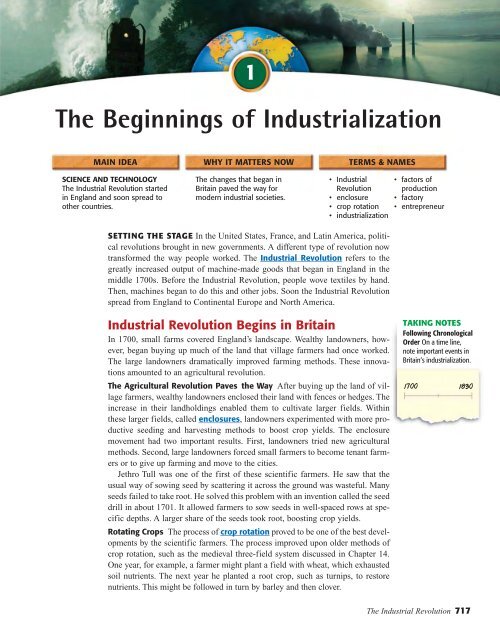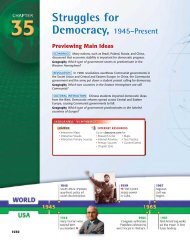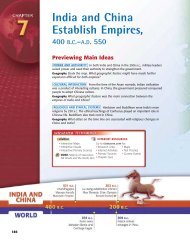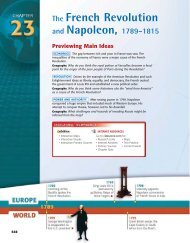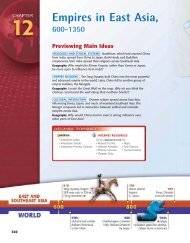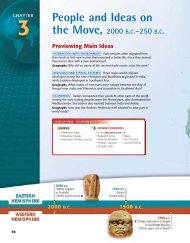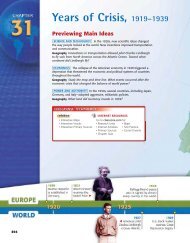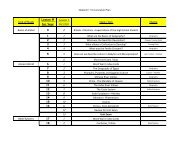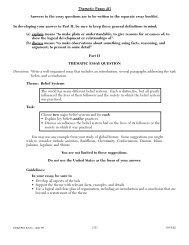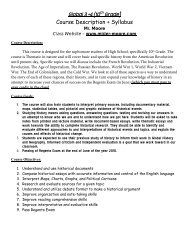The Industrial Revolution, 1700– 1900 Previewing Main Ideas
The Industrial Revolution, 1700– 1900 Previewing Main Ideas
The Industrial Revolution, 1700– 1900 Previewing Main Ideas
Create successful ePaper yourself
Turn your PDF publications into a flip-book with our unique Google optimized e-Paper software.
MAIN IDEA WHY IT MATTERS NOW TERMS & NAMES<br />
SCIENCE AND TECHNOLOGY<br />
<strong>The</strong> <strong>Industrial</strong> <strong>Revolution</strong> started<br />
in England and soon spread to<br />
other countries.<br />
1<br />
<strong>The</strong> Beginnings of <strong>Industrial</strong>ization<br />
<strong>The</strong> changes that began in<br />
Britain paved the way for<br />
modern industrial societies.<br />
• <strong>Industrial</strong><br />
<strong>Revolution</strong><br />
• enclosure<br />
• crop rotation<br />
• industrialization<br />
SETTING THE STAGE In the United States, France, and Latin America, political<br />
revolutions brought in new governments. A different type of revolution now<br />
transformed the way people worked. <strong>The</strong> <strong>Industrial</strong> <strong>Revolution</strong> refers to the<br />
greatly increased output of machine-made goods that began in England in the<br />
middle 1700s. Before the <strong>Industrial</strong> <strong>Revolution</strong>, people wove textiles by hand.<br />
<strong>The</strong>n, machines began to do this and other jobs. Soon the <strong>Industrial</strong> <strong>Revolution</strong><br />
spread from England to Continental Europe and North America.<br />
<strong>Industrial</strong> <strong>Revolution</strong> Begins in Britain<br />
In 1700, small farms covered England’s landscape. Wealthy landowners, however,<br />
began buying up much of the land that village farmers had once worked.<br />
<strong>The</strong> large landowners dramatically improved farming methods. <strong>The</strong>se innovations<br />
amounted to an agricultural revolution.<br />
<strong>The</strong> Agricultural <strong>Revolution</strong> Paves the Way After buying up the land of village<br />
farmers, wealthy landowners enclosed their land with fences or hedges. <strong>The</strong><br />
increase in their landholdings enabled them to cultivate larger fields. Within<br />
these larger fields, called enclosures, landowners experimented with more productive<br />
seeding and harvesting methods to boost crop yields. <strong>The</strong> enclosure<br />
movement had two important results. First, landowners tried new agricultural<br />
methods. Second, large landowners forced small farmers to become tenant farmers<br />
or to give up farming and move to the cities.<br />
Jethro Tull was one of the first of these scientific farmers. He saw that the<br />
usual way of sowing seed by scattering it across the ground was wasteful. Many<br />
seeds failed to take root. He solved this problem with an invention called the seed<br />
drill in about 1701. It allowed farmers to sow seeds in well-spaced rows at specific<br />
depths. A larger share of the seeds took root, boosting crop yields.<br />
Rotating Crops <strong>The</strong> process of crop rotation proved to be one of the best developments<br />
by the scientific farmers. <strong>The</strong> process improved upon older methods of<br />
crop rotation, such as the medieval three-field system discussed in Chapter 14.<br />
One year, for example, a farmer might plant a field with wheat, which exhausted<br />
soil nutrients. <strong>The</strong> next year he planted a root crop, such as turnips, to restore<br />
nutrients. This might be followed in turn by barley and then clover.<br />
• factors of<br />
production<br />
• factory<br />
• entrepreneur<br />
TAKING NOTES<br />
Following Chronological<br />
Order On a time line,<br />
note important events in<br />
Britain‘s industrialization.<br />
1700 1830<br />
<strong>The</strong> <strong>Industrial</strong> <strong>Revolution</strong> 717


